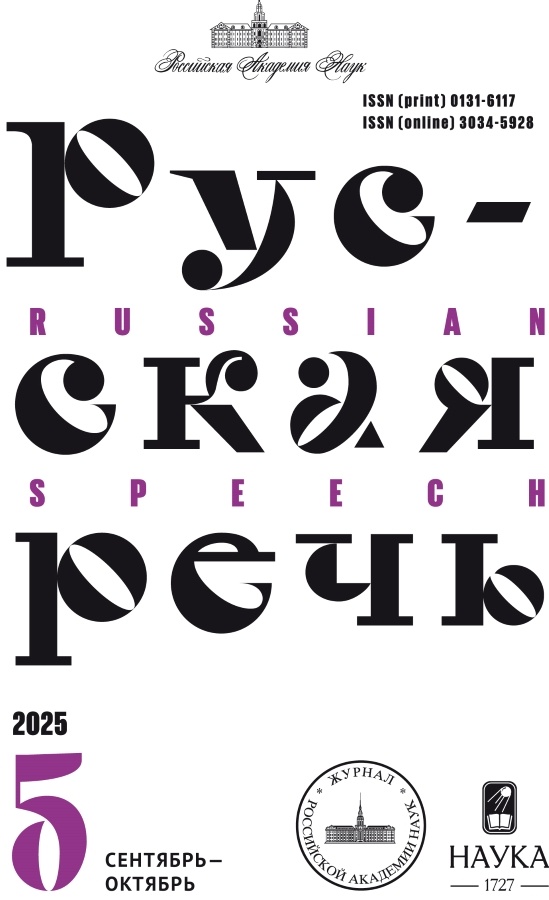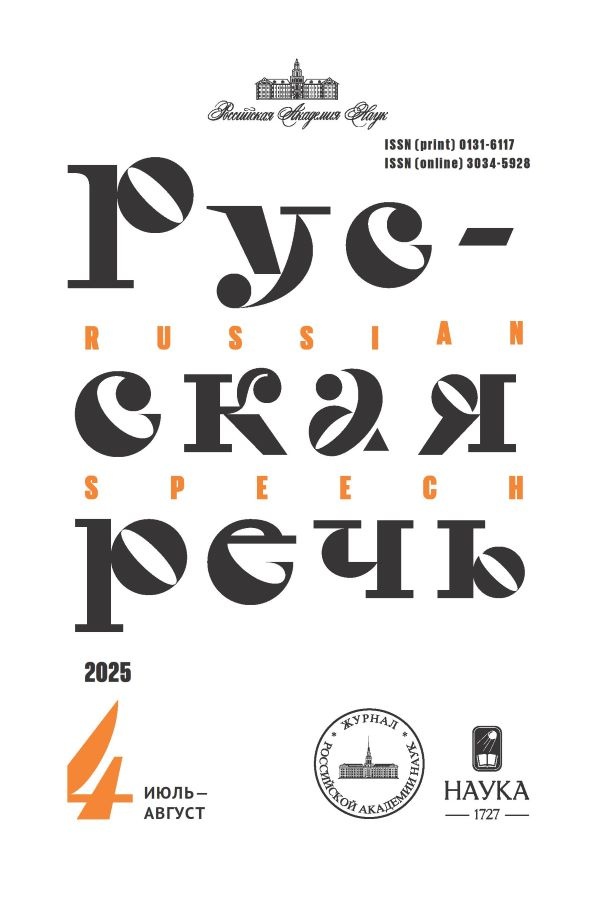Особенности акцентуации словоформ в составе фразеологизмов
- Авторы: Коробейникова Т.Н.1
-
Учреждения:
- Институт русского языка им. В. В. Виноградова РАН
- Выпуск: № 4 (2025)
- Страницы: 65-74
- Раздел: Проблемы современного русского языка
- URL: https://ruspoj.com/0131-6117/article/view/689159
- DOI: https://doi.org/10.31857/S0131611725040051
- ID: 689159
Полный текст
Аннотация
Часто орфоэпические словари фиксируют в словоформах в составе фразеологизмов старый вариант ударения, который уже не используется в этих же словоформах в свободных сочетаниях. Например, в трех вода́х, а не в трех во́дах, какими судьба́ми, а не какими су́дьбами. Однако в ходе пяти экспериментов с москвичами — носителями литературного произношения — было выявлено, что акцентуация многих словоформ в составе фразеологизмов отличается от той, которая рекомендована орфоэпическими словарями. Ударение в этих словоформах либо становится таким же, как в свободных сочетаниях, либо варьируется у респондентов разных возрастных групп, либо (в редких случаях) «особое» ударение сохраняется. При этом многие словоформы в составе фразеологизмов отражают акцентуационные процессы, протекающие в тех же словоформах в свободных сочетаниях. Эти процессы следует фиксировать в словарях, вводя допустимые старшие и младшие варианты произношения. В то же время варианты, отмеченные в ударении церковнославянизмов, образований от имен собственных, историзмов и архаизмов в составе фразеологизмов, объясняются незнанием этих слов, а следовательно, должны даваться в орфоэпических словарях с запретительными пометами. В зависимости от соотношения вариантов произношения исследованные фразеологизмы были разделены на 8 групп, представленных в статье.
Ключевые слова
Полный текст
Об авторах
Татьяна Николаевна Коробейникова
Институт русского языка им. В. В. Виноградова РАН
Автор, ответственный за переписку.
Email: tkorobejnikova@inbox.ru
Россия, Москва
Список литературы
- Аванесов Р. И. (ред.). Орфоэпический словарь русского языка: произношение, ударение, грамматические формы / С. Н. Борунова, В. Л. Воронцова, Н. А. Еськова. М.: Русский язык, 1983. 703 с.
- Воронцова В. Л. Русское литературное ударение XVIII–XX вв. Формы словоизменения. М.: Наука, 1979. 328 с.
- Каленчук М. Л., Савинов Д. М., Скачедубова Е. С. Активные процессы в просодической системе русского языка: акцентуация прилагательных // Русский язык в научном освещении. 2017. № 2 (34). С. 9–28.
- Касаткин Л. Л. (ред.). Большой орфоэпический словарь русского языка. Литературное произношение и ударение начала XXI века: норма и ее варианты. М. Л. Каленчук, Л. Л. Касаткин, Р. Ф. Касаткина. М.: АСТ-ПРЕСС, 2012. 1001 с.
- Коробейникова Т. Н. Фразеологизмы в зеркале орфоэпии: акцентуационные варианты и динамика норм // Русская речь. 2023. № 2. С. 29–42.
- Кузнецов С. А. (гл. ред.). Большой толковый словарь русского языка. СПб.: Норинт, 1998. 1534 с.
- Национальный корпус русского языка [Электронный ресурс]. URL: https://ruscorpora.ru (дата обращения: 04.10.2024).
- Резниченко И. Л. Словарь ударения и произношения слов русского языка. 5–9 кл. М.: АСТ-ПРЕСС Школа, 2021. 368 с.











